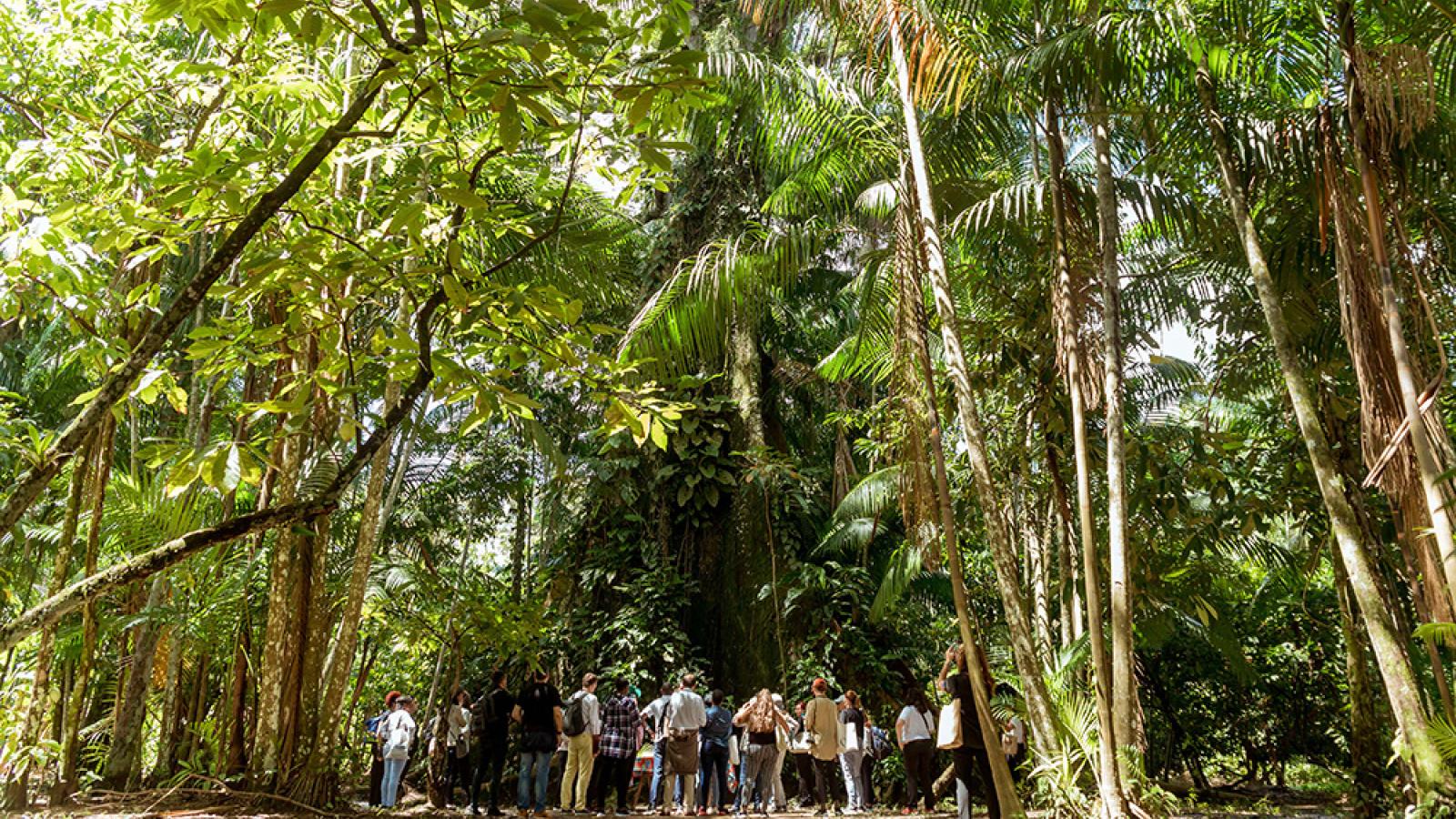Recap
Laying the Foundation for the Green, Resilient Cities of the Future in Latin America
Focusing on how climate finance can evolve to meet the needs of cities and nature, the UrbanShift Latin America Forum united a wide range of stakeholders to build capacity for transformative change.
Amid the vast Amazon River delta, Belém, Brazil sits at the intersection of the urban and the natural worlds. A network of waterways and islands where resources like açaí and cacao are grown and harvested surround the city, which serves as a critical port for Brazil and the Amazon region. As Belém prepares to host COP30 next year, foregrounding the importance of the region in global climate discussions, the impacts of climate change, from mounting heat to intensifying rainfall, are taking hold in the city.
Against this backdrop, UrbanShift gathered over 250 leaders from 35 countries across Latin America and the Caribbean, along with Asia and Africa, for the UrbanShift Latin America Forum—four intensive days of collaboration around strengthening financing for green and resilient cities. “We need a discussion on urban climate financing mechanisms. We need to advocate for the inclusion of urban climate finance targets in the global conversation. And we need to champion the role that cities can play in reaching our global climate goals,” said Rogier van den Berg, Director of the WRI Ross Center for Sustainable Cities, during the Forum’s opening ceremony. The UrbanShift Latin America Forum delivered all three. Through workshops on public-private collaboration for urban bioeconomies and more sustainable approaches to tourism, deep-dive sessions with investors on urban climate adaptation pipelines, inspiring high-level panels, and three City Academy courses—covering circular economy strategies, accommodating urban growth, and accessing urban climate finance—the Forum offered participants tangible tools for strengthening and financing their urban resilience policies and projects.
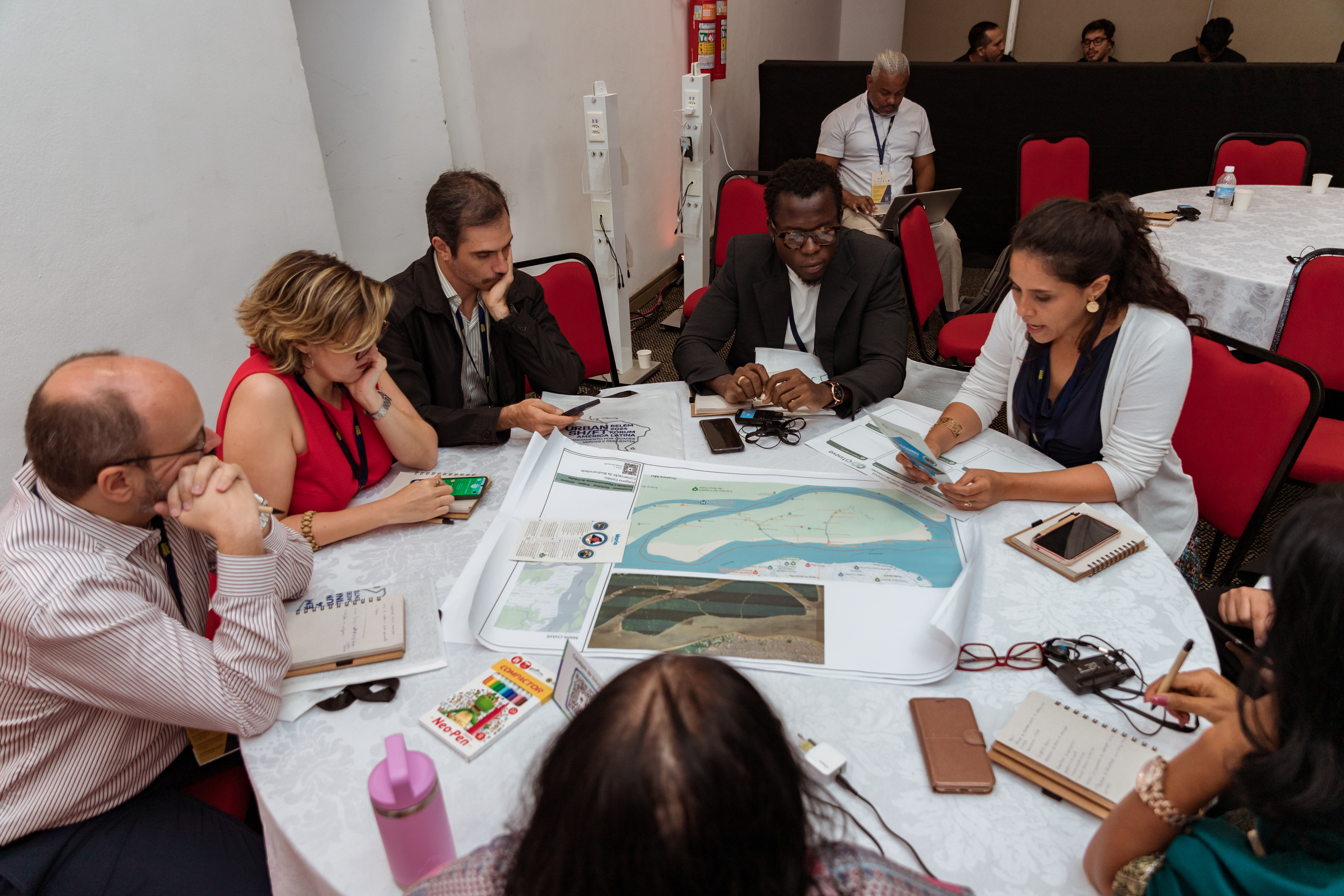
The Forum will continue to create ripple effects across the UrbanShift network in Latin America, as cities apply ideas from the workshops to their local initiatives. We look forward to sharing more outcomes and in-depth deep dives from the Forum this year. In the meantime, read on for the three key takeaways from the UrbanShift Latin America Forum.
Climate financing strategies must center on cities
Despite a projected need of $5.4 trillion per year, cities are currently receiving only 1% of the climate finance that they need to become more resilient in the face of climate change. For projects focused on climate adaptation, financial resources are even more constrained. “Financing must reach the local level--the cities, the city dwellers, the people who suffer with heat waves, who lose their belongings, and in the worst cases, their lives,” said Ilan Cuperstien, Regional Director for Latin America for C40 Cities. “These are seemingly abstract topics, but they affect people’s lives.”
The UrbanShift Latin America Forum galvanized a conversation around how global climate financing structures need to evolve to ensure resources flow directly to cities—where adaptation and resilience measures can be implemented most quickly. “Our global climate finance architecture is not designed to work with cities--it’s designed to work with national governments,” said Andrea Fernández, Managing Director for Climate Finance, Knowledge, and Partnerships at C40 Cities. “There’s a real structural issue with our climate finance infrastructure.” But Tatiana Gallego Lizon, Chief of the Housing and Urban Development Division at the Inter-American Development Bank, noted that within development banks like the IDB, there has been a shift in recent years to focus more financing on climate action efforts, and to work directly with cities through initiatives built around clear targets for success. Evolving climate financing mechanisms to best meet the needs of cities, though, said Mohamed Bakarr, Manager, Integration and Knowledge Management Division at the Global Environment Facility, will require funders breaking away from traditional approaches. “We know city priorities can be addressed in ways that generate environmental benefits, but also make life better for people who live in cities,” he said. “These priorities have to be addressed in an integrated manner. A sector-by-sector approach doesn’t work for cities. Cities are a microcosm of the planet, and we can’t solve anything in isolation."
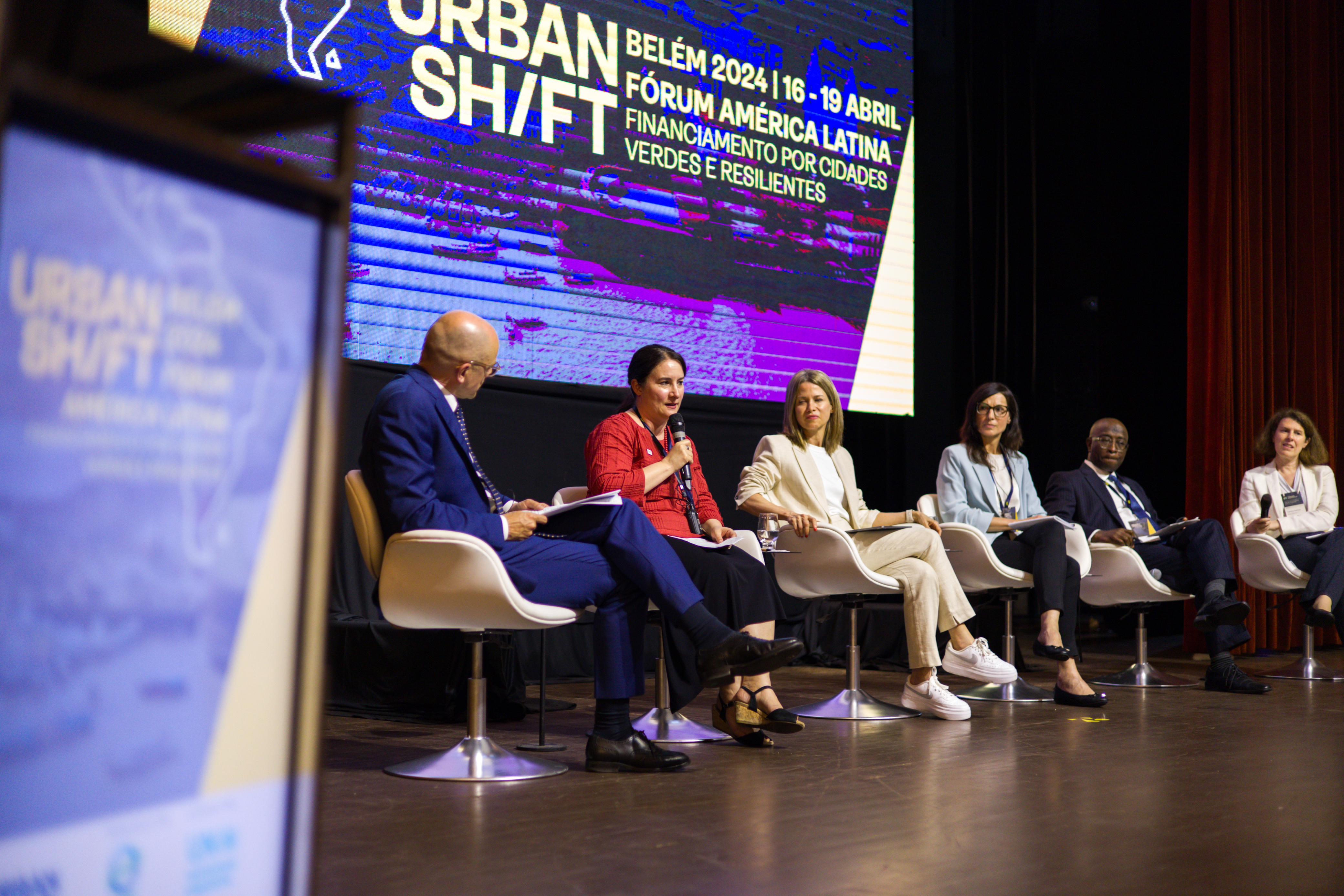
But the Forum also equipped participants from cities with the tools and resources they need to better work within the existing financial system and access finance for local climate action projects. A day-long Investors Roundtable led by C40 Cities focused on financing for adaptation projects brought representatives from 13 Latin American cities into direct conversation with financers to raise awareness about the investment opportunity on adaptation-related projects in Latin American cities, receive feedback on how to strengthen adaptation projects to attract investment and overcome the urban investment challenges. Alongside the Roundtable, C40 released an investors guide on the pipeline of urban adaptation projects in Latin America. During the final two days of the Forum, ICLEI delivered an UrbanShift City Academy course on Accessing Urban Climate Finance, which offered participants an assessment of the current finance landscape and tools and resources for cities to overcome financing barriers for climate projects. As part of this training, ICLEI guided participants through how to prepare applications for ICLEI’s Transformative Actions Program—a core part of UrbanShift’s finance offer which helps local and regional governments ensure their project’s bankability. “It’s very difficult to transform ideas into projects, and that is the focus of TAP,” said Eszter Mogyorósy, Head of Innovative Finance for ICLEI. “We help shape the projects at the very early stages until they interest development banks and financiers.”
Through the dual approach of advocating for transformation within the financing sector and equipping city leaders with the resources to implement and scale transformative projects, the UrbanShift Forum aimed to accelerate climate action and resilience projects across the region.
Learn more about Accessing Urban Climate Finance through the UrbanShift Online City Academy
Protecting natural resources can accelerate urban economies
Especially in the heart of the Amazon, the conversation about urban development is inextricable from its impact on natural ecosystems. Traditionally, urbanization has come at the expense of ecosystem health. "We have become fundamentally detached from natural processes," said Sharon Gil, Programme Manager and Cities Lead at UN Environment Programme. But the UrbanShift Forum offered new models for urban development that center and strengthen natural systems and resources. During the ICLEI-led City Academy course on Circular Economy Strategies for Sustainable Development, participants learned how approaches to waste management and food production can not only preserve and protect natural resources, but can also stimulate local economies through creating good, green jobs. "Waste is not a resource we are currently extracting financial value from," said Magash Naidoo, Head of Circular Development at ICLEI. But city-level circular programs that collect and transform waste into useful goods, like construction materials, can keep pollution out of green areas and spur the development of new local sectors. The course also introduced participants to ways that cities can advocate for policy changes to shift away from wasteful approaches, like the ICLEI-organized Local and Subnational Governments Coalition to End Plastic Pollution. Learn more about this initiative here.
Learn more about Circular Economy Strategies through the UrbanShift Online City Academy

The UrbanShift Forum and the Circular Economy course also dove deep into how cities can harness the idea of an urban bioeconomy to fuel sustainable growth and protect natural resources. Rather than leaning on extractive and wasteful production methods that generate materials that flow into cities and out through waste streams, a bioeconomy makes uses of renewable, local biological resources to produce food, materials, and energy, benefitting the health and economic wellbeing of local communities. In Belém, the potential of an urban bioeconomy is taking root. On nearby Combu Island, which Forum participants visited for one of the site visits, Filha do Combu harvests cacao, process it on the island, and circulates the resulting products through the Brazilian economy, including restaurants. By retaining full control of the production and distribution chain, Filha do Combu can ensure a stronger profit and local economic benefit while adhering to sustainable harvesting and production practices.
During the Forum, C40 Cities convened discussions on how cities can collaborate with the private sector to develop and scale initiatives that strike a productive balance between the needs of developing cities and the constraints and potential of surrounding natural ecosystems. Through the City-Business Hub, participants from cities and the private sector explored strategies for collaborating on sustainable approaches like urban bioeconomies and creating good, green jobs. The City-Business Climate Alliance Workshop convened a productive discussion on how the tourism industry can and should evolve to become more efficient and sustainable. For more insights, check out C40 Cities’ Guide to Public-Private Collaboration in the Global South (now available in Spanish and Portuguese) and their new white paper on sustainable tourism strategies for cities.
Urban growth can strike a balance with equity and ecosystem health
Latin America is one the most urbanized regions in the world: Over 80% of its population lives in cities. In the region, the issue of growth revolves less around expanding urban footprints and more around maximizing and strengthening the urban infrastructure that exists today to create more resilient and equitable cities. As Latin America has urbanized, informal settlements have proliferated. Around 21% of urban residents live in informal settlements today. These areas, said Pablo Lazo, Director of Urban Development at WRI Ross Center for Sustainable Cities, “are most vulnerable to climate change and face a lot of risks." "We are in an emergency situation due to climate change,” added Anacláudia Rossbach, Director for Latin America and Caribbean at Lincoln Institute of Land Policy. “We are facing more conflicts and disasters that will require action, and we have to be able to respond in a coordinated way and use this moment to strengthen our response infrastructure and resilience.”

A major focus of the UrbanShift Latin America Forum, particularly during the City Academy course on Accommodating Urban Growth, was how to ensure the resilience of urban areas—especially informal settlements—amid an intensifying climate crisis. Planning with nature, said Aloke Barnwal, Senior Climate Change Specialist at the GEF, can provide benefits to urban residents, from lowering temperatures to improving air quality, while combatting ecosystem erosion. “Urban expansion can be more informed and better planned to ensure cities integrate nature into their planning and work toward the goals of reducing biodiversity and nature loss,” he said.
Comprehensive city planning processes that take a climate action lens are essential to strengthening present and future resilience. During the Accommodating Urban Growth course, Guillermo Orbegozo Malca, Executive Director of the Metropolitan Planning Institute for Lima, described how the city is approaching its resilience planning process. Fenced in by mountains and the ocean, he said, the city has reached the limit of its territorial growth, and much of the recent expansion of the city has been informal settlements stretching into the peripheral steep areas. Given these constraints, the city is now taking area-specific approaches to work with communities to upgrade settlements, integrating green space and improved transportation options for residents. “The idea is to empower families so they can work with this development approach, to improve their health and access to recreation,” he said.
Even in highly urbanized regions like Latin America, cities are not stagnant. They hold enormous potential to evolve and become more resilient. Cities can focus on adding housing density, implementing low-carbon transportation options, integrating nature and climate-change mitigation strategies like permeable and reflective surfaces. Most importantly, they can work directly with residents most vulnerable to the impacts of climate change and economic volatility to ensure their stability, well-being, and empowerment. “We need complete neighborhoods for all,” said Cibele Assmann, Urban Planner for the city of Florianopolis, Brazil. “We see how the lack of connectivity contributes to traffic, emissions, and lower quality of life. We need to centralize resources and create neighborhoods where resources are accessible to all.”
Learn more about Accommodating Urban Growth through the UrbanShift Online City Academy
The UrbanShift Latin America Forum tackled a broad range of issues, all of which must be understood as part of the same conversation. Resilient and sustainable urban development depends on new and innovative approaches to financing, alongside thoughtful development strategies. We appreciate all of the leaders who joined us at the Forum to learn and share their expertise, and look forward to seeing the best practices discussed take root.
Learn how UrbanShift is Supporting Resilience and Sustainability in Latin American Cities
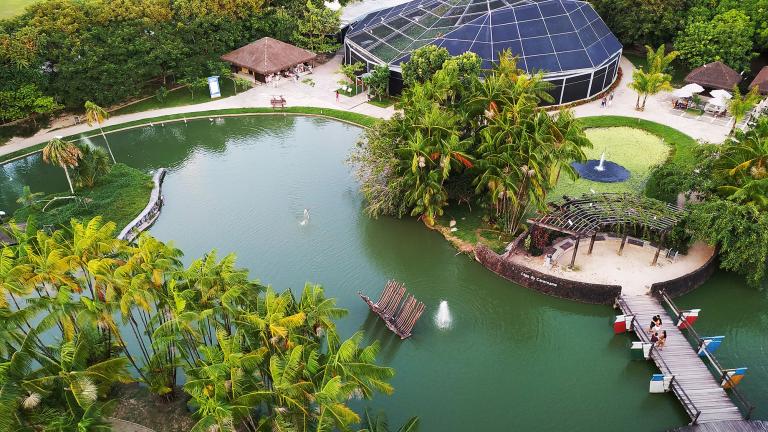
UrbanShift Latin America Forum
Focusing on the theme of financing for green and resilient cities, this Forum offered capacity-building and networking opportunities for cities across Latin America.

Unlocking Subnational Finance for Green Sectorial Transformation: A Focus on Buildings & Cooling
Hosted during COP30 in Belém, Brazil, these dynamic panel discussions will explore strategies for enhancing access to transformative finance, and how these resources can support local climate transitions.
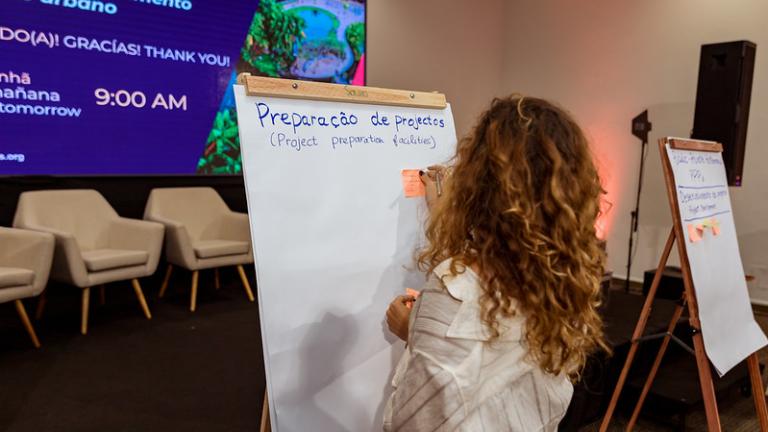
Sustainable Finance Action and Advocacy: A Roadmap for Global South Cities
This C40-led webinar, held alongside 4th International Conference on Financing for Development (FfD4), aimed to equip mayors with the tools they need to advocate for expanded and accelerated access to urban climate finance.
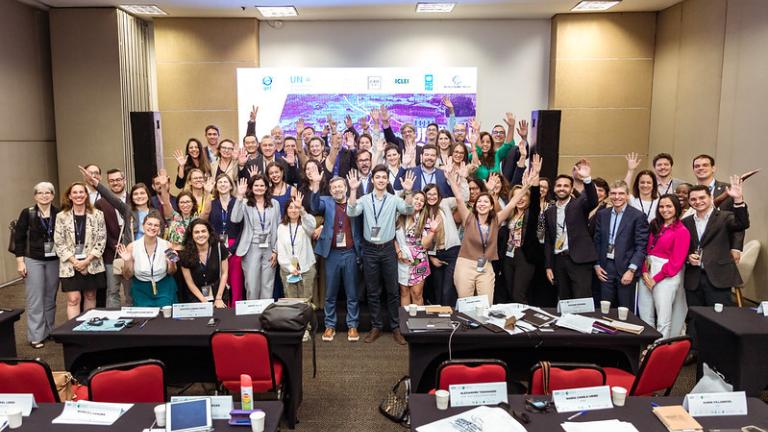
UrbanShift Looks Back: On the Value of Expanding Access to Urban Climate Finance
C40's Jessy Appavoo, ICLEI's André Almeida da Vila, and UNEP's Sharon Gil share why and how UrbanShift has prioritized support for cities to access climate finance.
